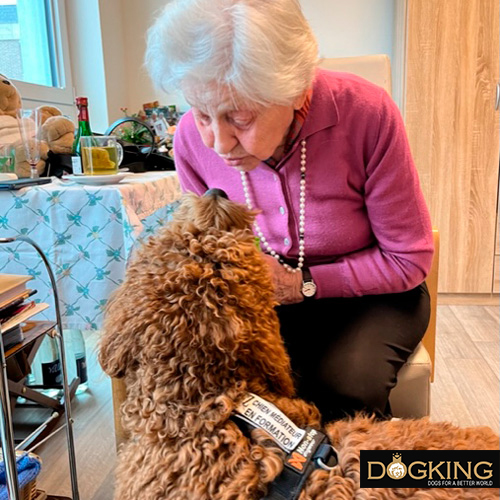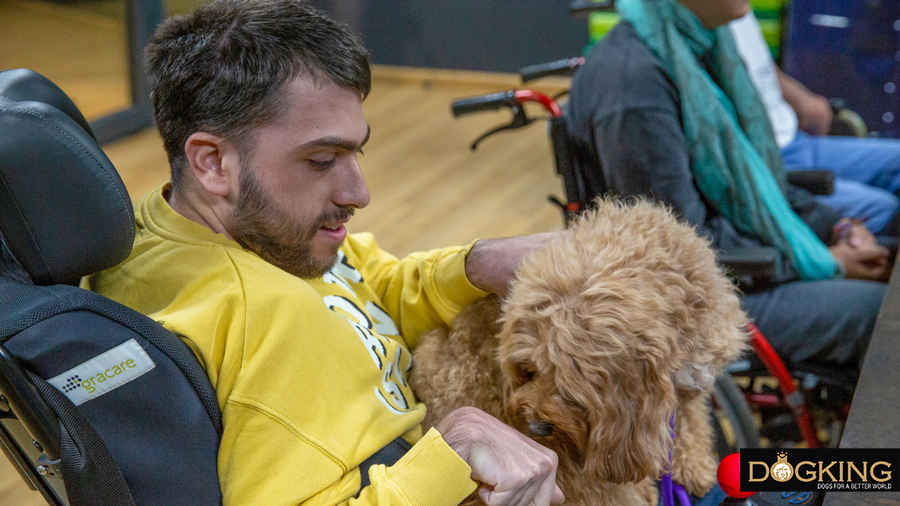What are emotional support dogs (dog therapist)
Dogs and their great humanitarian work

EMOTIONAL SUPPORT DOGS
Reading time about 10 minutes
Dogs have been our most faithful companions throughout history, not only for the support they give in certain tasks, but also because of the enormous emotional help they provide unconditionally. Just some of the effects that emotional support dogs may bring to us are: reduced feelings of loneliness, greater social interaction, lower stress levels and, in general, a better mood. However what exactly does the work of these animals consist of?

Table of contents
1- The emotional impact of a dog
2- What is an emotional support dog? (dog therapist)
3- Is a dog therapist the same as a therapy dog?
4- Requirements for an emotional assistance dog (dog therapist)
5- The Australian Cobberdogs' emotional support
The emotional impact of a dog
-
Psychological benefits
 Owning a dog not only reduces the number of medical visits by people, but also makes any medical appointments that need to be attended more bearable. It should come as no surprise, then, to see patients in hospitals accompanied by a dog to support them in their treatment.
Owning a dog not only reduces the number of medical visits by people, but also makes any medical appointments that need to be attended more bearable. It should come as no surprise, then, to see patients in hospitals accompanied by a dog to support them in their treatment.
In addition, the influence of these animals has resulted in lower levels of anxiety, which leads to correct blood pressure. This has been especially favourable for elderly people, who in studies carried out with nurses showed lower blood pressure when they were accompanied by a dog. Also, given that the presence of canines calms people in stressful situations, dogs can be the best companion in difficult moments such as, for example, when going to court with victims of mistreatment.
Such is the emotional support provided by these pets that, regardless of whether the dog is trained or not, they have achieved improvements in cases of depression. In a reference study whose sample were groups of students with depressive traits, a significant improvement was observed in those who participated in animal-assisted therapies compared to those who attended ordinary therapies. Moreover, in the same AAI provided in DOGKING, people with special needs improve their mood after each session and show a satisfactory emotional evolution at the end of the programme.
-
Psychosocial benefits
 Pets, and especially dogs, often mitigate feelings of loneliness, especially for people in a highly vulnerable situation. Older people in retirement and experiencing the loss of spouses or friends, for example, describe themselves as "depressed". However, the answer is different for those who have a dog to keep them company despite similar circumstances. But having a canine by their side can not only meet the social need to a large extent, but can also promote it. Being social beings by nature as we are, a lack of socialisation inevitably has an impact on our mental well-being and, consequently, on our physical well-being. It has also been shown that when dogs are around people, they are more likely to open up and engage in conversation. Moreover, thanks to the company of a dog, it is easier to normalise the situation of people with special conditions, thus facilitating their integration into groups.
Pets, and especially dogs, often mitigate feelings of loneliness, especially for people in a highly vulnerable situation. Older people in retirement and experiencing the loss of spouses or friends, for example, describe themselves as "depressed". However, the answer is different for those who have a dog to keep them company despite similar circumstances. But having a canine by their side can not only meet the social need to a large extent, but can also promote it. Being social beings by nature as we are, a lack of socialisation inevitably has an impact on our mental well-being and, consequently, on our physical well-being. It has also been shown that when dogs are around people, they are more likely to open up and engage in conversation. Moreover, thanks to the company of a dog, it is easier to normalise the situation of people with special conditions, thus facilitating their integration into groups.
-
Physiological benefits
 All of the above psychological benefits also have a favourable impact on the physical level. In fact, it has been verified that pet owners have a higher survival rate against hospitalisation for heart attacks, myocardial infarctions or chest pains. What's more, pet owners are less likely to suffer from coronary heart disease. This is because, beyond helping to cope better with stress or bonding, owning a dog means maintaining exercise levels that help the cardiovascular system.
All of the above psychological benefits also have a favourable impact on the physical level. In fact, it has been verified that pet owners have a higher survival rate against hospitalisation for heart attacks, myocardial infarctions or chest pains. What's more, pet owners are less likely to suffer from coronary heart disease. This is because, beyond helping to cope better with stress or bonding, owning a dog means maintaining exercise levels that help the cardiovascular system.
What is an emotional support dog? (dog therapist)
Is a dog therapist the same as a therapy dog?
Therapy dogs are to be distinguished from assistance dogs or emotional support dogs (dog therapist). While a therapy dog can and should also provide emotional support to patients, not every emotional support dog can serve as a therapy dog. What's more, the only requirements for a dog to be able to work as an emotional support dogs is to be able to establish a bond with its owner and have a good behaviour apart from a great sensitivity towards people, as well as being sufficiently trained to comply with the basic rules of coexistence and not to present behavioural problems.
Requirements for an emotional assistance dog (dog therapist)
What is the current regulation?
The Australian Cobberdogs' emotional support
Not just any dog can adop the role of an emotional support dog. It has to be a dog that meets special conditions and, above all, has a special sensitivity towards people. There are some dogs that are more likely to fit in, given their temperament and the characteristics which they innately denote.
But not everything is based solely on the signs of affection or companionship that these dogs usually show to everyone around them, but also on their great capacity for integration in different areas and their resilience to the problems that may arise in a person's day-to-day life. This is where the essence of this breed lies. Even if we are in a vulnerable situation or if we can't correspond to them in the same way they show their love, Australian Cobberdogs will always give you and show their support without any condition. What's more, they know how to read expressions very well and can sense when someone needs support or space without having to ask for it. In addition, their willingness to gratify and please people makes them feel motivated to learn new signals. As a result, they usually have an above-average level of training, which allows them to comply with the basic rules of coexistence and not to restrict any activity of the person they are accompanying.

Hundreds of people with psychological and physiological difficulties have already experienced first-hand the emotional effect of Australian Cobberdogs, seeing improvements both in family situations and in therapies where they genuinely assist professionals and users. In fact, the bond they establish with people goes beyond what is commonly known about the species, largely thanks to their empathy and willingness to help others. A willingness that means there is no greater reason for their happiness than to see you happy.